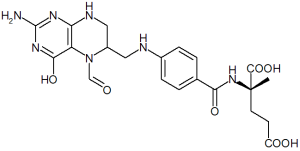Calcium folinate
Folinic acid (INN) or leucovorin (USAN), generally administered as calcium folinate (or leucovorin calcium), is an adjuvant used in cancer chemotherapy involving the drug methotrexate. It is also used in synergistic combination with the chemotherapy 5-fluorouracil. more...
Folinic acid is not folic acid.
Mechanism of action
Folinic acid is a 5-formyl-derivative of tetrahydrofolic acid. It is readily converted to other reduced folic acid derivatives (e.g. tetrahydrofolate). Since it does not require the action of dihydrofolate reductase for its conversion, it will be unaffected by inhibition of this enzyme by drugs such as methotrexate.
This, therefore, allows for purine/pyrimidine synthesis to occur; so normal DNA replication and RNA transcription processes can proceed.
Therapeutic use
Folinic acid, when administered at the appropriate time following methotrexate as part of a total chemotherapeutic plan, where it may "rescue" bone marrow and gastrointestinal mucosa cells from methotrexate. There is no apparent effect on preexisting methotrexate-induced nephrotoxicity. (Therapeutic Information Resources Australia, 2004)
Whilst not specifically an antidote for methotrexate, folinic acid may also be useful in the treatment of acute methotrexate overdose.
Folinic acid is also used in combination with the chemotherapy 5-fluorouracil in treating colon cancer. In this case, folinic acid is not used for "rescue" purposes. Rather, folinic acid enhances the effect of 5-fluorouracil on inhibiting thymidylate synthase.
Folinic acid is also sometimes used to prevent toxic effects of high doses of antimicrobial dihydrofolate reductase inhibitors such as trimethoprim and pyrimethamine.
Read more at Wikipedia.org



